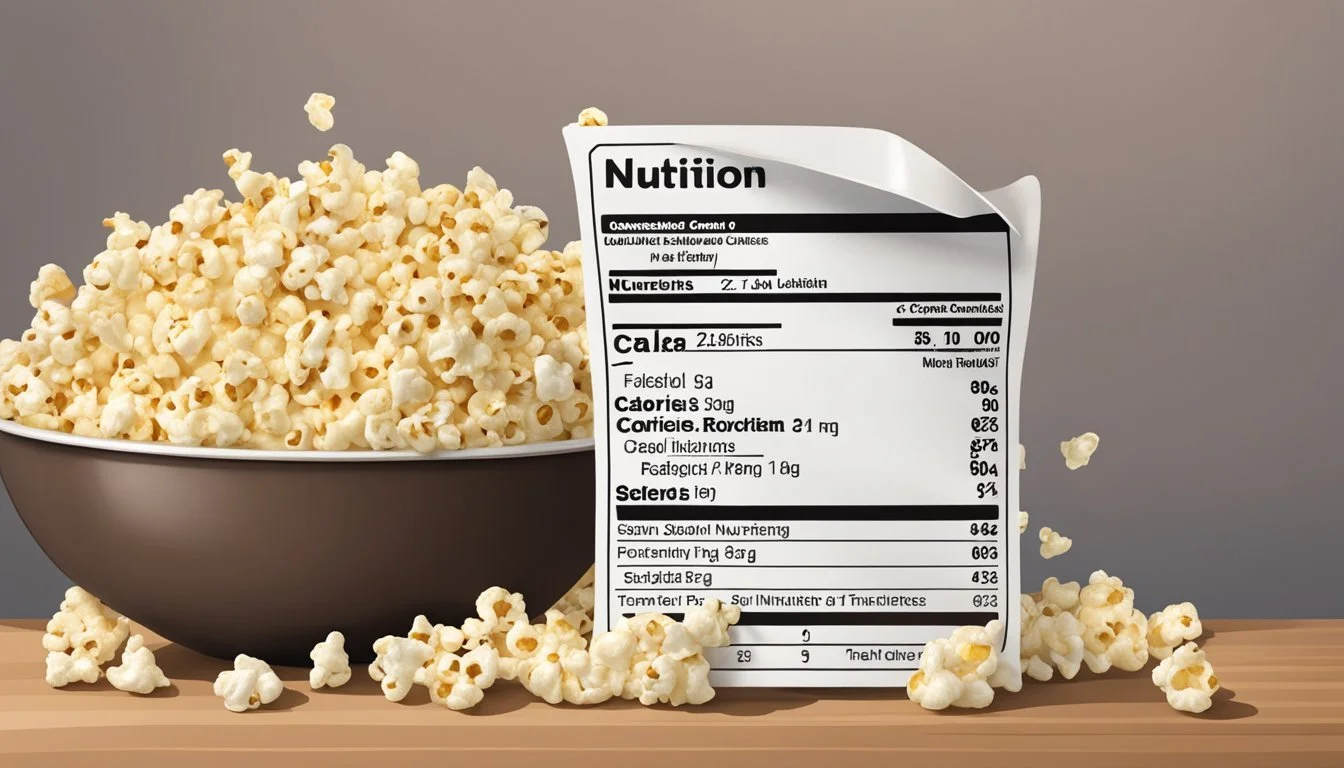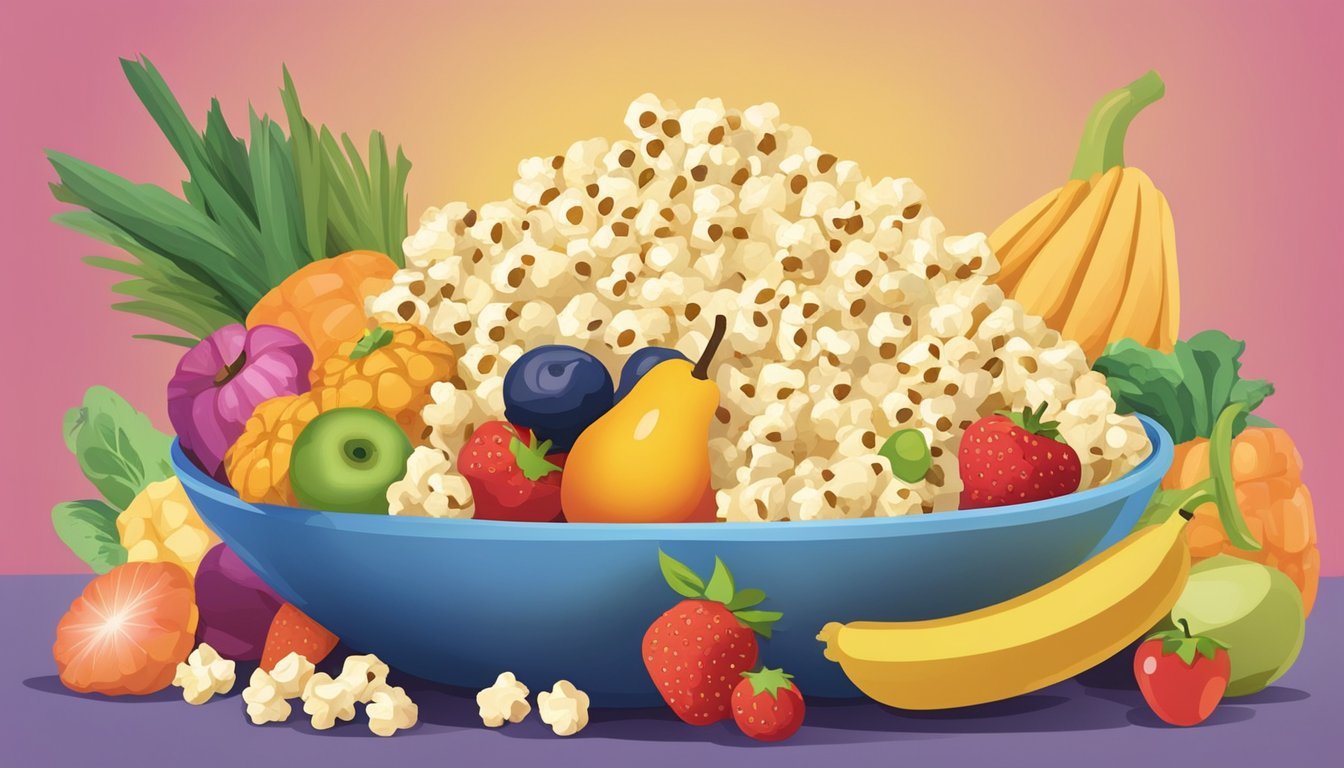Is Popcorn a Healthy Snack or a Movie Theater Menace?
Unveiling the Nutritional Truth
Popcorn is a ubiquitous snack that has become synonymous with movie-going experiences. Its reputation as a simple, tasty treat is often weighed against its nutritional content and preparation methods. Popped from the natural grains of corn, it is lauded for its whole-grain status, fibrous content, and low-calorie nature when air-popped. In essence, popcorn in its purest form can indeed be a healthy snack option.
However, the popcorn served at movie theaters often tells a different story. Typically prepared with large amounts of butter, oil, and salt, this version of the snack can accumulate calories and sodium at levels much higher than its homemade counterpart. The added toppings can turn popcorn into a dietary concern for consumers paying attention to caloric intake, sodium, and fat consumption. This has spurred debates on whether popcorn should be considered a healthy snack or a movie theater menace.
While consumers might think that opting for a bucket of popcorn over a candy bar is the better choice, the nutritional content of movie theater popcorn can vary dramatically. The preparation process and portion sizes can result in a product high in calories, saturated fat, and sodium, factors that contribute to its questionable status in a health-conscious diet. Therefore, when assessing its health implications, one must consider the preparation and serving size of the popcorn being consumed.
Popcorn Nutrition Profile
The popcorn nutrition profile is diverse, featuring a balance of whole grains, fiber, and essential vitamins and minerals. It provides a nutrient-dense snack option when portion sizes are controlled.
Whole Grains and Fiber Content
Popcorn is a whole grain, which means it contains all parts of the grain kernel. A three-cup serving of air-popped popcorn typically contains:
Calories: 93
Protein: 3 grams
Carbohydrates: 18.6 grams
Dietary Fiber: 3.6 grams
Fat: 1.1 grams
Sugar: 0.2 grams
Due to its high dietary fiber content, popcorn aids in digestion and can contribute to feeling full, thus helping with appetite control.
Calories and Portion Sizes
The caloric value of popcorn varies significantly based on its preparation method. Oil-popped popcorn generally contains more calories due to higher fat content. For a three-cup serving:
Oil-Popped Popcorn: Approximately 165 calories without added salt or butter.
On the other hand, commercially prepared popcorn, especially those sold at movie theaters, can contain up to 1,090 calories for a large tub, accompanied by high levels of sodium.
Vitamins and Minerals
Popcorn provides a variety of vitamins and minerals that are important for maintaining health, such as:
Iron: Essential for transporting oxygen in the blood.
Niacin: Benefits the digestive system, skin, and nerves.
Folate: Important for making DNA and other genetic material.
Thiamin: Involved in many body functions, including nervous system and muscle function.
Vitamin B6: Essential for protein metabolism.
The presence of these nutrients makes popcorn a healthful choice as part of a balanced diet when it is not laden with excess fats or salt.
Health Benefits of Popcorn
Popcorn, when prepared in a health-conscious manner, is not only a low-calorie, whole-grain snack but also contributes positively to digestive health and weight management due to its high fiber content. It also provides a good source of antioxidants and polyphenols, which are beneficial in reducing the risk of many chronic diseases.
Antioxidants and Polyphenols
Popcorn contains a notable amount of antioxidants and polyphenols, specifically phenolic acids, which are known for their role in preventing various diseases. Antioxidants help neutralize harmful free radicals, thereby reducing the risk of cancer and heart disease. The polyphenols in popcorn are concentrated in the hull—making those unpopped kernels at the bottom of the bowl particularly rich in these healthy compounds.
Digestive Health and High-Fiber Benefits
As a high-fiber whole grain, popcorn can support digestive health. Fiber aids in the smooth function of the digestive system and can help manage blood sugar levels, which is beneficial for individuals with diabetes. The consumption of high-fiber foods is also linked with a lower risk of cardiovascular disease. In terms of digestive health, a diet rich in fiber can help prevent constipation and may lower the risk of certain cancers, such as colorectal cancer.
Weight Management and Satiety
Popcorn can be an excellent component of a weight management diet due to its low-calorie nature and ability to promote satiety. The fiber content in popcorn not only helps with digestive health but also contributes to a feeling of fullness, which can reduce overall calorie intake and aid in weight loss efforts. Opting for air-popped popcorn without added oils or butters can maintain the snack's low-calorie profile, making it a healthier choice over many other snacks (What wine goes well with snacks?).
Popcorn as Part of a Balanced Diet
Popcorn, when prepared appropriately, can serve as a healthy whole grain snack that fits into a balanced diet. This section will assess popcorn's nutritional profile, its comparison to fruits and vegetables, and the importance of serving sizes.
Comparison to Fruits and Vegetables
Both fruits and vegetables are essential components of a balanced diet, providing a wide range of vitamins, minerals, and fiber. Popcorn, being a whole grain, complements these food groups by offering its own set of nutritional benefits. According to the federal dietary guidelines, whole grains like popcorn can contribute to daily fiber and essential nutrient intake. However, unlike fruits and vegetables which contain more vitamins and minerals per serving, popcorn should be considered a part of the grain group serving recommendations.
Serving Sizes and Daily Recommendations
The Federal Dietary Guidelines suggest that the average adult requires at least half of their grain servings to be whole grains. Popcorn can help meet this requirement. For a healthy snack, a serving size is typically:
Air-popped popcorn: 3 cups (approx. 93 calories)
Protein: 3 grams
Carbohydrates: 18.6 grams
Fiber: 3.6 grams
Sugar: 0.2 grams
Fat: 1.1 grams
It is advisable to keep portion sizes moderate to avoid excess calorie intake and to forgo toppings like butter and sugar, which can transform popcorn into a high-calorie, less nutritious snack.
Popcorn in the Movie Theater
Movie theater popcorn is renowned for its distinct taste and aroma, but the nutritional content is often a cause for health-conscious concern due to its high calorie, salt, and saturated fat content.
Movie Theater Popcorn Contents
Calories: A typical tub of movie theater popcorn can contain up to 1,090 calories, which is significant when compared to daily calorie needs.
Fat: This popcorn is cooked in oil, and when topped with butter, it greatly increases its content of saturated and trans fats.
Sodium: The pleasure of salty popcorn comes with a hefty dose of sodium, with amounts reaching up to 2,650 milligrams per tub.
Composition:
Butter: Often added to enhance flavor, contributing to the fat content.
Oil: Used in popping the kernels, it increases fat and calorie count.
Salt: Added for taste, significantly raising sodium levels.
Nutrient Table:
Nutrient Content in a typical tub Calories 1,090 Sodium 2,650 mg Fat Varies with butter add-on
Alternatives to Traditional Movie Snacks
Instead of settling for the traditional concession stand popcorn, moviegoers can opt for healthier snacks:
Pretzels: A large soft pretzel is lower in calories and can be flavored with low-calorie mustard.
Yogurt: For those preferring a sweet option, yogurt is a healthier alternative to candy.
Nachos: If chosen without the additional cheese sauce, nachos can be a more calorie-conscious option.
Healthier Snack Options:
Soft Pretzel (with mustard instead of cheese)
Yogurt (a better sweet treat compared to candy)
Nachos (minus the excessive toppings)
By considering the nutritional information and available alternatives, moviegoers can make more informed choices at the theater concession stand.
Different Ways to Prepare Popcorn
Popcorn can vary widely in its health profile depending on how it's cooked and seasoned. By choosing healthier cooking methods and seasonings, popcorn can be a nutritious snack.
Healthier Cooking Methods
Air-popped popcorn stands out as one of the healthiest preparation methods. This method avoids the use of oils altogether, resulting in a lighter snack that is low in calories and fat. For those who prefer a bit of oil, using olive oil or canola oil can be a healthier choice compared to butter due to their higher content of mono- and polyunsaturated fats. These oils can be lightly drizzled over the kernels before popping in a stovetop popper or pot.
Microwave without oil: Some microwaveable bowls are designed to air-pop corn without any oil.
Stovetop with oil: A minimal amount of olive or canola oil can be heated in a pot before adding kernels.
Seasonings and Healthy Flavoring
After popcorn is popped, it can be flavored in a variety of ways. For maintaining a healthy profile, it’s important to be mindful of the seasonings used:
Salt and Pepper: A classic and simple choice, sprinkle lightly to taste.
Cinnamon: Adds a sweet note without the need for sugar.
Chile Flakes: For those who enjoy heat, a dash can add spice without calories.
Grated Cheese: A small amount of grated cheese can add flavor; opt for versions with no added salt.
Opting for herbs and spices over commercially available popcorn seasonings can also help to reduce sodium intake and avoid added artificial flavors and preservatives. Keep in mind, the key to keeping popcorn healthy is using these seasonings sparingly to avoid turning a low-calorie snack into a high-sodium, high-calorie one.
Understanding Popcorn's Potential Health Risks
While popcorn can be a healthy snack when prepared properly, there are potential health risks associated with certain types of popcorn and preparation methods. This section examines the main concerns related to unhealthy additives and sodium content as well as the specific issues tied to microwave popcorn.
Unhealthy Additives and High Sodium
Many people enhance the flavor of their popcorn with added salt, butter, and other toppings, which can quickly elevate the calorie and sodium content. Excessive sodium intake is a concern as it can lead to hypertension and increase the risk for heart disease and stroke. For instance, a large tub of movie theater popcorn can contain significant amounts of sodium, far exceeding daily recommended limits. When popcorn is consumed with large amounts of added salt, sugar, or butter, it loses its merit as a healthy snack and becomes a vehicle for weight gain and other health risks.
Microwave Popcorn Concerns
Microwave popcorn presents its own unique risks. Some microwave popcorn bags contain chemicals that can vaporize and inhaled, potentially leading to respiratory issues known as "popcorn lung." This condition, more formally known as bronchiolitis obliterans, is characterized by shortness of breath and wheezing, and is associated with the chemical diacetyl, which was previously used for its buttery flavor. While many brands have phased out the use of diacetyl, the safety of other chemicals that have replaced it has not been extensively studied. Consumers should be cautious with microwave popcorn and consider air-popped popcorn as a safer alternative.
Expert Perspectives on Popcorn
Experts analyze popcorn's health implications by considering its nutritional profile and the role it can play in disease prevention, both when consumed in its pure form and in its commercial movie theater variant.
Dietary Guidelines and Scientific Research
According to the American Heart Association and Federal Dietary Guidelines, popcorn prepared with heart-healthy oils and minimal salt can be a nutritious addition to one's diet. It is naturally high in dietary fiber and low in calories when air-popped and free from added sugars, saturated fats, or excessive sodium. The University of Rhode Island suggests that incorporating whole grains like popcorn contributes to a well-rounded diet and can support blood circulation.
Key Nutritional Facts of Air-Popped Popcorn (per 3 cups):
Calories: Approximately 100-120
Dietary Fiber: Around 3.5-4 grams
Sodium: Minimal when unsalted
Popcorn's Role in Preventative Health
Popcorn's role in preventative health is noteworthy. High fiber content supports digestive health and can help regulate blood sugar levels, making it a valuable snack for managing weight and preventing chronic conditions. However, dietitians caution against the high calorie and sodium content of commercial movie theater popcorn, which can negatively impact heart health due to its preparation with large quantities of butter and salt.
Comparison of Popcorn Types:
Type Calories Total Fat Saturated Fat Sodium Air-Popped (3 cups) ~120 Low Low Minimal Movie Theater (1 tub) ~1,090 High High ~2,650mg
Preventative Health Benefits of Air-Popped Popcorn:
Fiber: Promotes satiety and supports digestive health.
Antioxidants: Contains polyphenols which may help protect against chronic diseases.
Low Caloric Density: Aids in weight control as part of a balanced diet.
In moderation and when prepared healthily, popcorn can be part of a heart-conscious and preventative health-focused diet.
Conclusion
Popcorn itself is a whole grain, inherently packed with fiber and antioxidants. When prepared at home with minimal added fats and salt, it serves as a nutritious, low-calorie option. Nutritionists often recommend air-popped popcorn due to its high fiber content and low calorie count.
However, movie theater popcorn contrasts sharply with its homemade counterpart. A typical tub from a theater could contain up to 1,090 calories and 2,650 milligrams of sodium, far exceeding dietary recommendations for a single serving. The added butter and flavorings in movie theater popcorn also introduce substantial amounts of saturated fats.
Nutrient Homemade Popcorn Movie Theater Popcorn Calories Low High Sodium Minimal Excessive Saturated Fats Low High
Consumers seeking a healthy snack should opt for popcorn made with minimal additions. As a snack, popcorn has the potential to be healthy, but one must be vigilant about how it is prepared and served. While it is a snack enjoyed by many, caution is particularly advised when indulging in popcorn at a movie theater, where the extra toppings can transform it into a dietary menace.
For those conscious about their health, enjoying popcorn in moderation and prepared with health in mind is key. It remains a favorite snack worldwide, but the way it is consumed should always align with one's nutritional goals and dietary restrictions.






